
French postcard, no. 675. Photo: Columbia Film.

Italian postcard by Vecchioni & Guadagno, Roma. Photo: Columbia EIA. Irene Dunne and Melvyn Douglas in Theodora Goes Wild (Richard Boleslawski, 1936), released in Italy as L'adorabile nemica (The adorable enemy).
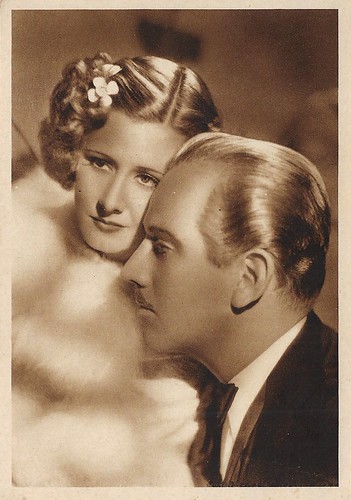
Italian postcard by Vecchioni & Guadagno, Roma. Photo: Columbia EIA. Irene Dunne and Melvyn Douglas in Theodora Goes Wild (Richard Boleslawski, 1936), released in Italy as L'adorabile nemica (The adorable enemy).

Belgian collectors card by Kwatta, no. C 181. Photo: MGM. Greta Garbo and Melvyn Douglas in Ninotschka (Ernst Lubitsch, 1939).
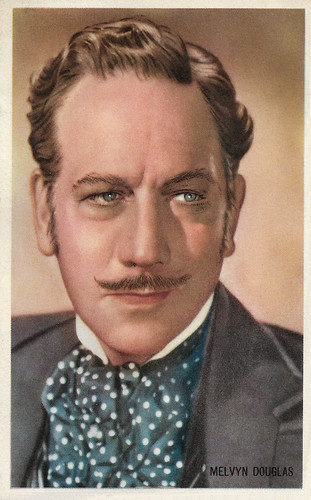
Belgian collectors card by Kwatta, Bois d'Haine, no. C. 270. Photo: MGM. Melvyn Douglas in The Great Sinner (Robert Siodmak, 1949).
A sensitive performer of even complex roles
Melvyn Douglas was born as Melvyn Edouard Hesselberg in Macon, USA, in 1901. He was the son of Lena Priscilla (née Shackelford) and Edouard Gregory Hesselberg, a well-known concert pianist and composer. Melvyn was determined at an early age to take to the stage. He never finished high school, as he focused entirely on his career as an actor.
Douglas developed his acting skills in Shakespearean repertory while in his teens and served in the United States Army in World War I. After the war, he appeared with stock companies in Sioux City, Iowa, Evansville, Indiana, Madison, Wisconsin and Detroit, Michigan. Finally, he made his Broadway debut in 1928 as a gangster in the drama 'A Free Soul.'
His greatest success on stage came with the comedy 'Tonight or Never'. Not only did the play run for 232 performances, but Douglas met the woman who would be his wife of nearly 50 years: his co-star, Helen Gahagan. They were married in 1931. His film debut followed in the film version, Tonight or Never (Mervyn LeRoy, 1931) alongside Gloria Swanson. His reputation as a sensitive performer of even complex roles earned him one of the leading roles alongside Greta Garbo in the adaptation of Luigi Pirandello's As You Desire Me (George Fitzmaurice, 1932). The film was a success. Douglas shared top billing with Boris Karloff and Charles Laughton in the sardonic horror classic The Old Dark House (James Whale, 1932).
Subsequent roles were more marginal and Douglas returned to Broadway in 1934. However, a lucrative non-exclusive contract with Columbia brought him back to Hollywood, where he rose to become one of the most popular comic actors of the decade with his performance alongside Claudette Colbert in She Married Her Boss (Gregory La Cava, 1935). He went on to star alongside some of the biggest female stars. Alongside Marlene Dietrich, he was seen in Angel (1937) directed by Ernst Lubitsch. Douglas starred alongside Irene Dunne in the Screwball comedy Theodora Gets Wild (Richard Boleslawski, 1936) and partnered with Joan Crawford several times, including in A Woman's Face (George Cukor, 1941).
One of his most sympathetic roles was as the belatedly attentive father of Freddie Bartholomew in Captains Courageous (Victor Fleming, 1937). His best-known role to this day was in Ninotchka (Ernst Lubitsch, 1939), where he made Greta Garbo laugh. He also co-starred in Garbo's final film, Two-Faced Woman (George Cukor, 1941).
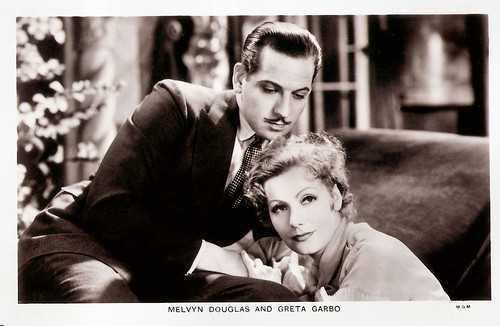
British postcard in the Film Partners series, no. P 82. Photo: MGM. Melvyn Douglas and Greta Garbo in As You Desire Me (Rouben Mamoulian, 1932).
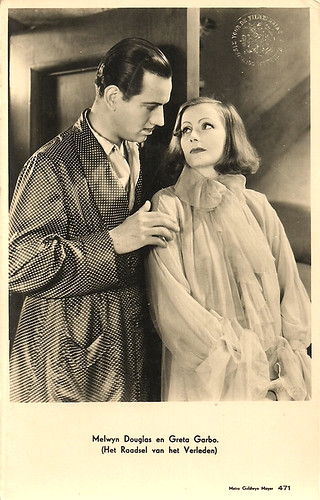
Dutch postcard, no. 471. Photo: Metro-Goldwyn-Mayer. Melvyn Douglas and Greta Garbo in As you desire me (Rouben Mamoulian, 1932), presented in the Netherlands as Het Raadsel van het Verleden (The Riddle of the Past). The stamp top right is that of the Dutch National Board of Censors. Gowns by Adrian.
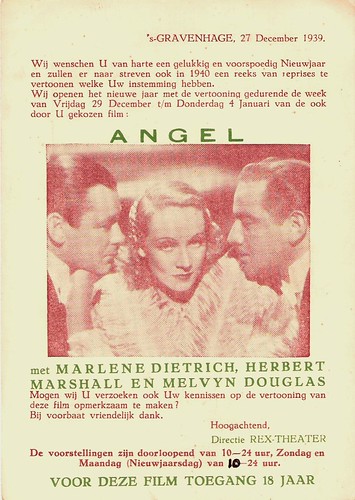
Dutch promotion card by Rex-Theater, 's-Gravenhage, 1939. Marlene Dietrich, Herbert Marshall and Melvyn Douglas in Angel (Ernst Lubitsch, 1937).

British Real Photograph postcard in the Film Partners Series, London, no. P 245. Photo: Columbia. Melvyn Douglas and Joan Blondell in There's Always a Woman (Alexander Hall, 1938).

Dutch postcard by M. Bonnist & Zonen, no. 115. Photo: Universal. Deanna Durbin and Melvyn Douglas in That Certain Age (Edward Ludwig, 1938). Collection: Marlene Pilaete.
Grey-listed
In 1942 Melvyn Douglas went to war again. His films after 1946, however, were rarely of the quality of his previous work. In the late 1940s, he was - along with fellow liberals Edward G. Robinson and Henry Fonda - grey-listed - not explicitly blacklisted, the three just weren't offered any work.
Douglas returned to Broadway once again. Here he visibly proved himself as a character actor and won a Tony Award for his performance in 'The Best Man'. It wasn't until the early 1960s that Douglas was back on the big screen. For his role as Paul Newman's father in the Western Hud (Martin Ritt, 1963), he won an Academy Award for Best Male Supporting Actor.
He received two more Oscar nominations and won one for the comedy-drama Being There (Hal Ashby, 1979) starring Peter Sellers. Douglas won a Tony Award for his Broadway lead role in 'The Best Man' (1960) by Gore Vidal, and an Emmy for his role in Do Not Go Gentle Into That Good Night (1967).
He continued to work as an actor until his death. Douglas appeared as Senator Joseph Carmichael in The Changeling (1980) and opposite Fred Astaire in Ghost Story (John Irvin, 1981) in his final completed film role. For his work, he was immortalised with two stars on the Hollywood Walk of Fame.
Douglas married Rosalind Hightower at a young age, with whom he had two children. In 1931, he remarried actress and politician Helen Gahagan, with whom he also had two children. Helen entered politics in the 1940s and won a seat in the US Congress. In 1950 she lost the election for Senator from California against Richard Nixon. The couple remained married until she died in 1980. Melvyn Douglas died a year later, in New York. He was 80.

Spanish postcard, no. CM. -318. Photo: Metro-Goldwyn-Mayer. Melvyn Douglas and Norma Shearer in We Were Dancing (Robert Z. Leonard, 1942).

British postcard in the Picturegoer Series, London, no. 706b. Photo: Metro Goldwyn Mayer.
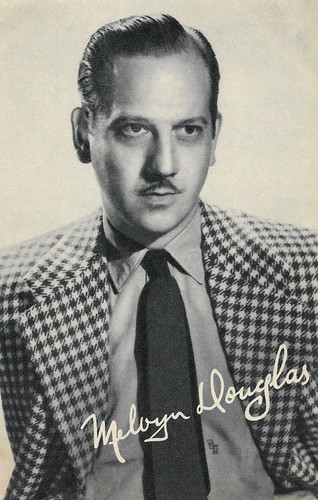
British Photogravure portrait postcard.
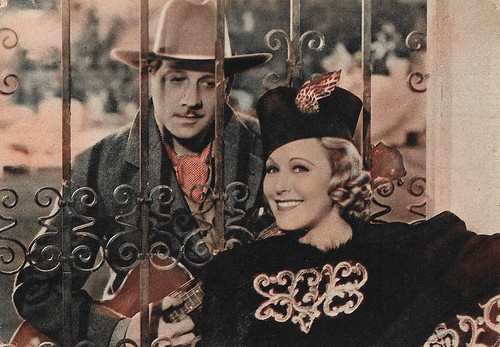
Italian postcard by Vecchioni & Guadagno, Roma. Photo: Columbia Pictures. Grace Moore and Melvyn Douglas in I'll Take Romance (Edward H. Griffith, 1937), released in Italy as Quando la vita e' romanzo (When Life is Romance). Publicity for the Cine Teatro Impero in Augusta, Sicily.
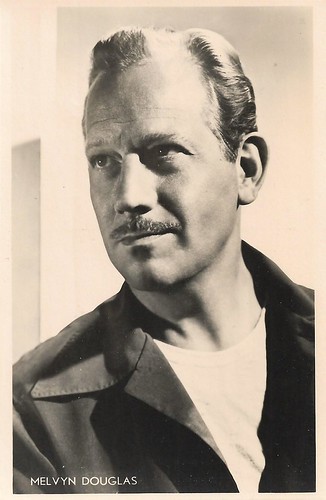
Dutch postcard by Ed. S. & v.H.A. Photo: M.P.E.A. (Motion Picture Export Association, founded in 1945 to promote the distribution of American cinema abroad).
Sources: Wikipedia (Dutch and English), and IMDb.
This post was last updated on 24 January 2024.
No comments:
Post a Comment